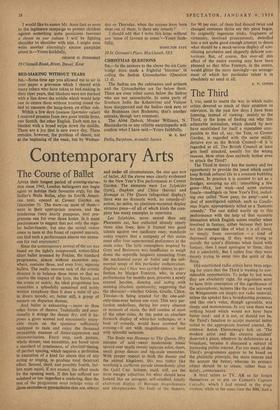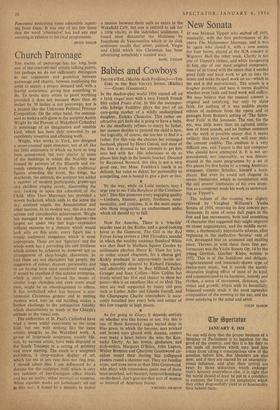The Third
I, TOO, used to resent the way in which radio critics devoted so much of their attention to television. In the past few days I have been listening, instead of viewing : mainly to the Third, in the hope of finding out why this admirable institution, which should by now have established for itself a reputation com- parable to that of, say, the Tate, or Covent Garden, is regarded with the same mildly derisive eye as the British Council—if it 'is regarded at all. The British Council at least gets itself attacked, usually for the wrong reasons. How often does anybody bother even • to attack the Third?
The Third in theory has the money and the opportunity to provide the yeast which could keep British cultural life in a constant bubbling ferment. In practice it is content to act as a dredger, scooping up silt : 'unearthing a few gems—Max, last week—and some curious fossils--madrigals on New Year's Eve, includ- ing one called 'Now peep, bo peep'—and a deal of unmitigated rubbish, such as Candle- mas Night, appropriately billed as a 'fantastic comedy.' The cast sidled warily up to this performance with the help of that eccentric intonation which English actors employ when involved in fantasy, either because they have not the remotest idea of what it is all about, or simply from convention — a kind of depressed singsong. If they were trying to parody the actor's dilemma when faced with fantasy, then I must apologise to them; they did it admirably. But I rather fear they were simply trying to enter into the spirit of the thing.
Old-established radio critics have been argu- ing for years that the Third is wasting its con- siderable opportunities. To judge by last week they are absolutely right. Its organisers seem to have little conception of the significance of' the microphone; lectures like the one last week on Wittgenstein arc simply not radio material, unless the speaker has a broadcasting presence, and this one's voice, though agreeable, was sleepy and monotonous. In any case there was nothing heard which would not have been better read : and it is not, or should not be, the Third's function to accept material better suited to the appropriate learned journal. By contrast Anton Ehrenzweig's talk on 'The modern artist and the creative accident' deserved a place, whatever its deficiencies as a broadcast, because it discussed a subject of increasing public interest. Far too many of the Third's programmes appear to be based on the philatelic principle, the more remote and the scarcer the better; whereas its primary object should be to create, rather than to satisfy, connoisseurs.
A brief salute to TV. AR so far forgot themselves as to put on Caiman's Captain which I had missed in the stage version; while at the some time the BBC had a Panorama containing some admirable report- ing from Gaza. It was one of the few times that the word 'alternative' has had any real meaning.in relation to the rival programmes.
BRIAN INGLIS



































 Previous page
Previous page